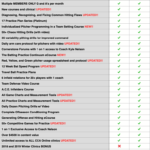Effective Communication with Parents Part I: Establishing the Groundwork
You will never be able to totally eliminate all parent problems, and no matter what you do, you will never be able to eliminate problems from the most extreme parents. There is just no reasoning with unreasonable people. However, there are several things you can do to minimize parental problems and use parents to your benefit as a coach.
Having recently become a parent myself, I realize that your kids are the center of your life, and you always want to the best for them. So if a significant portion of their life is being controlled by someone they do not know or do not trust, problems may ensue. Many of the problems at the beginning of your coaching career are simply unavoidable because people don't yet know you or trust you.
I do feel that as your coaching career moves on, there are several steps you can take to have more effective communication with parents and prevent many problems before they start.
The list below gives you some ways to build this positive
1.) Give parents a role on the team.
I believe that most parents want to be supportive of their kid’s athletic programs and want to help out in any way possible. Some may do this with the expectation that it will help their son gain more playing time.
Make it very clear that a parent’s involvement in the team will have no effect on their playing time. The integrity of your program will be better off in the long run.
Some ideas for them to help with the team include setting up committees such as "Double Header Food," "Senior Night," "Awards Banquet," "Team Dinner," and "Field Help" committees.
This approach can have two very positive affects. This will grow trust between the coaching staff and the parents, and you will enhance some aspect of your program, or take some of the work away from yourself.
2.) Get to know them long before they get to you
Getting parents involved is a fantastic way to alleviate many parent problems in the short term, but if you want long term success with parents in you have to start building a relationship with them before they get to you.
[wp_ad_camp_3]
Obviously, if you coach a one year team like an in house recreational team, there is no way to accomplish this, but almost every other level of baseball has some way you can get involved with the younger kids before they get there.
Getting involved in the youth organizations in your area is a great way to start to build positive relationships. We have implemented many youth camps and clinics that help build that trust between our coaches, our players and the surrounding community.
The biggest benefit to this is when you have do have to have a difficult discussion with a parent (and it will happen) they will be familiar with your philosophies and there will hopefully be some level of trust built up. It makes those conversations easier to have.
As successful as the other camps and clinics we have implemented have been, by far the biggest hit has been our father-son camp. Dads and sons attend for 2 hours on two separate Sundays. At this camp we do not coach the kids at all. We coach the dads and let them coach their sons.
We also have father/son competitions where they can win official gear from our team. This has been a tremendous hit and it is a very enjoyable to day for the parents, staff, our players, and most importantly, the young players who attend.
3.) Make decisions that are impartial
This tends to go without saying, but you have to make sure that you are treating people fairly (fair does not always mean equal) and treating all players and parents with respect no matter what happens.
Have a decision making process in place for tryouts, who gets to play when, and stick to it. Parents may not always agree with your decisions, but at least you will be able to explain your decision making process.
4.) Be transparent, especially with money
Travel baseball costs a lot of money, if you are going to charge people a whole bunch of money to play for your team, you should probably let them know roughly what that money is going to. If you are going to pay yourself a salary (and this is OK!) be transparent about it.
Even at the high school level, we let parents know how much our trip costs and any additional revenue coming in for the trip so they know how much to expect to pay and exactly what that money is going to.
[wp_ad_camp_3]
Implementing the above ideas and developing positive relationships will not diffuse all parent complaints, but it will help to limit them. Some people are unreasonable and will find things to complain about no matter how great of a job you are doing. In the next section I will discuss the best ways to manage parent complaints in season and how to handle difficult situation when they arise.
If you enjoyed blog, and have enjoyed the content available in our Bronze-Library, there is so much more available in our Cornerstone Elite Membership.
See what it looks like on the inside HERE.
Subscribe to our podcast on iTunes:
 Posted by Kyle Nelson
Posted by Kyle Nelson- Posted in Parents
 Dec, 19, 2012
Dec, 19, 2012 No Comments.
No Comments.
Elite members login here
Check out what’s New/Hot!
Recognizing, Diagnosing, and Fixing Common Hitting Flaws eCourse The 3 metrics we tested on Blast motion sensors this year Sneak Peek Inside an Elite Q and A The batting practice continuum Elite Member’s area table of contents 50+ “Chaos” hitting drills
5 sample Chaos hitting drills FREE
Mental Skills and Culture Building The hitting pyramid Welcome Elite Member, Trey! Ideas for a pitcher first practice 12 week bat speed improvement plan Make plans this offseason to have your team playing their best baseball at the end of the year” Top 5 hitting drills to translate practice skill to game performanceHow we used Blast Motion sensors with a team in 2019
What to do if your hitters are overmatched Welcome Elite Member, Tommy! Setting your baserunners up for success Welcome Elite Member, Mike! A consulting call with Elite Member Matt FREE Web Clinic: Developing Athletic, Consistent, Extraordinary Infielders
 Coach Kyle Nelson
Coach Kyle Nelson




